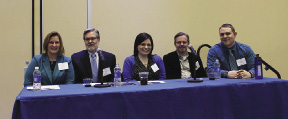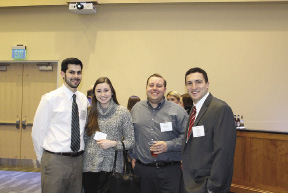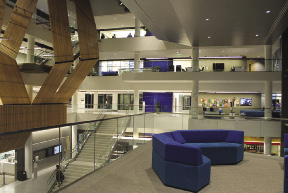On Thursday, March 12, the IFMA Boston Chapter hosted an event at UMass Lowell. The event depicted the journey of reconstructing the core of the University's three campuses (North, South, and East). Initial plans came about in spring 2011, and with acquisition of St. Joseph's Hospital, the project was officially underway. St. Joseph's Hospital was a local landmark that had been vacant for several years, and was in a location that would be integral to connecting the campuses. The hospital served as one of six total buildings that together are called University Crossing. Within University Crossing, the campus was able to centralize the bookstore, create an additional food court, increase parking capacity, as well as add more room for student services and programs. Also critical to the success of the project was bridging the gap between the campuses on either side of the Merrimack River. This was achieved by relocating the existing bridge to a more convenient location, thus improving traffic flow and ease of access for both students and the local Lowell community.
The night of the event began with a networking session over drinks and appetizers within University Crossing. The main event kicked off with a panel discussion, which comprised of several speakers who were from the UMass Lowell internal planning and design team directly involved in the campus facility project. One of the speakers was Maria Sophia, a project manager at the university who had a lot of insight into the transition of students, faculty, and workplaces from their previous location to their new home at University Crossing. Another speaker was Adam Dunbar, a recent graduate of UMass Lowell, who is now the assistant director for Student Affairs. Dunbar is responsible for the daily operations of University Crossing, and he showcased the amount of praise that the project received from the students and campus organizations. Jean Robinson, Director Capital Project, was also on the panel and she discussed the support that was necessary in modernizing the facility. She particularly focused on the interior design, mechanical and capacity requirements, as well as the moving coordination during the project. Finally, owners project executive Dirk vanLuling spoke about the measures taken during the construction that will make the facility LEED certified.
Following the panel discussion, attendees were split into smaller groups to have a tour of the facility by the members of the internal planning and design team. The tours gave insight to the truly modern and sophisticated environment throughout University Crossing. Attendees were thus able to see up-close and personal just how useful the rooms and spaces within the building were for students at UMass Lowell.
Overall, the event concluded with members taking away a sense of appreciation for the LEED certified, state-of-the art facility, which provides one-stop shopping for all student needs. It will be interesting to see if other universities will emulate the concept of the University Crossing project and the success that came from it.
 (1).png)










